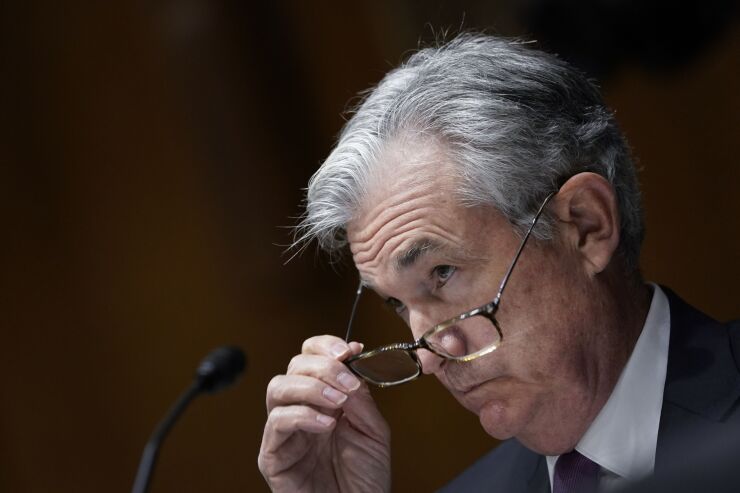WASHINGTON — The Federal Reserve is primarily interested in looking at a central bank digital currency that would improve the payment system, rather than one that would replace the physical dollar, said Chair Jerome Powell.
“Unlike some jurisdictions, here in the United States we continue to see strong demand for cash,” he said during a panel on cross-border payments and digital currencies hosted Monday by the International Monetary Fund. “Moreover, we have robust and mature financial and banking sectors, and we have a highly banked population so that many — although not all — already have access to the electronic payments system.”
Although the Fed has not said if it will move to develop a central bank digital currency, it is among several central banks exploring the possibility, and has various ongoing research efforts to analyze the impact a nationalized digital dollar would have on the U.S. financial system.
But while some countries like China and Sweden are moving toward central bank digital currencies that envision cash being phased out entirely, Powell signaled Monday that the Fed is looking at a central bank digital currency that would instead supplement the already-existing payments infrastructure in the U.S.

“We think it's important that any potential CBDC would serve as a complement to, and not a replacement for, cash and current private sector digital forms of the dollar such as commercial bank money,” he said.
Powell also added that while the U.S. has an obligation to “stay on the forefront” of innovations like central bank digital currency, the Fed also has a responsibility to thoroughly analyze the costs and benefits of a digital dollar.
“I actually do think this is one of those issues where it's more important for the United States to get it right than it is to be first,” he said. “Given the dollar’s important role globally, it's essential that we remain on the frontier of research and policy development.”
He said that the U.S. needs to look at several important policy questions in evaluating whether or not to develop a central bank digital currency, including how it would be protected from cyber attacks, how it would affect monetary policy and financial stability and how it would prevent criminal activity while also maintaining user privacy.
“Yes, there are potential benefits, but that's going to take a lot of work and thought, we believe,” Powell said. “So they're not simple questions and the answers are going to need to be comprehensively understood.”
Many have championed the idea of a central bank digital currency as a way to provide quicker and cheaper transactions, as well as access to segments of the population that have been traditionally underserved by banks. But the concept gained traction when Facebook announced its Libra cryptocurrency project in 2019 with the aim of creating a single global digital currency.
The announcement of the Libra project drew immediate backlash from lawmakers and regulatory officials, who
Libra did highlight the need to revamp cross-border payments, Powell said, and did focus more attention on payments issues.
“It's probably too early to say how much Libra will ultimately shape the payments system,” Powell said. “I do think it has caused regulators to think carefully about the appropriate risk management and compliance expectations for emerging innovations.”





